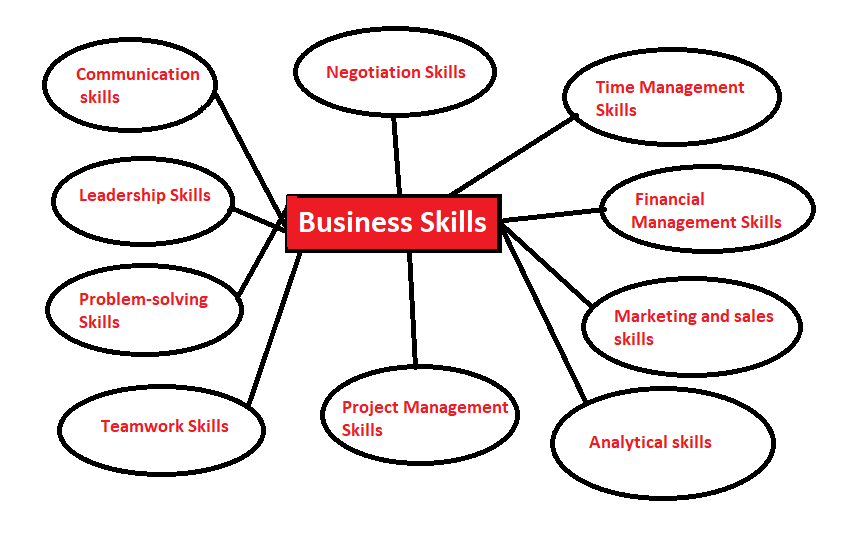Developing your business sense may help you become a better leader and provide chances for personal development, whatever your field. Improving certain talents may help you become more competent, adapt to a changing work environment, and advance your career.
In this article, we will delve into the top 10 business skills vital for thriving in today’s competitive work landscape.
The Importance of Developing Your Business Skills
Business abilities are crucial for career advancement. Time management, communication, decision-making, and problem-solving may help you succeed as an employee and entrepreneur. Business skills provide several work opportunities and need constant growth for professional success.
Work performance and company success need corporate skills. Firm owners, team leaders, and workers require analytical, interpersonal, and problem-solving skills. Employers value soft skills like communication, cooperation, and innovation because they help firms succeed.
Business skills are needed for customer service. You meet supervisor, colleague, and client expectations with these talents. Employers value both technical and soft skills. Therefore, enhance your business talents to prove yourself. Gain transferable skills to remain competitive and increase your work prospects.
10 Skills You Need to Succeed in Business
Hard and soft skills must be combined for company success. Hard skills are, e.g., learnable abilities like software expertise or subject-matter expertise. Conversely, soft skills are about your mannerisms and social interactions; they include cooperation, problem-solving, and good communication.

Here are 10 skills that are essential for success in business:
1. Communication skills:
Any business can only succeed with effective communication. Information exchange both within and outside of the workplace facilitates teamwork, decision-making, and task completion. People who can communicate well get along, work through issues, and accomplish their professional objectives. At work, relationships, conflict resolution, and goal achievement need good discourse.
People communicate with one another in ways other than meetings and calls these days. Quick tasks may be accomplished with the help of email, Skype, social networks, and instant messaging.
2. Leadership Skills:
Effective leaders inspire and encourage others to achieve goals, regardless of management level. Active leaders routinely organize, encourage, and support colleagues. Leaders need interpersonal skills to form relationships.
Leadership skills include building relationships, being agile and adaptable, encouraging innovation and creativity, motivating others, making decisions, resolving conflicts, negotiating, using critical thinking, coaching and mentoring, and setting goals.
3. Problem-solving skills:
Having good problem-solving skills is super important if you want to do well in business. It means being able to think carefully and come up with answers to tricky issues. Doing research, making smart choices, and keeping calm when things get tough are all really important skills for solving problems. In business, problem-solving means figuring out ways to get rid of obstacles that are stopping you from reaching your goals. It’s all about closing the gap between what you want to happen and what’s actually happening.
4.Teamwork Skills:
5. Negotiation Skills:
Negotiation is a skill we utilize daily, whether it’s coordinating plans with friends or advocating for our needs in the workplace. Strong negotiation skills enable us to clearly convey our requirements, discover common ground with others, and devise solutions that benefit all parties. These skills are particularly vital in the business arena, facilitating effective communication and the attainment of mutually advantageous agreements. Key negotiation skills encompass emotional intelligence, realistic goal-setting, patience, persuasion, and relationship-building.
6. Project Management Skills:
Project management skills are essential for team organization and goal achievement. While leadership emphasizes teamwork and encouragement, management involves devising strategies and coordinating resources. Key skills in project management include coordination, guidance, decision-making, planning, and accountability for tasks.
Many companies utilize projects to accomplish their objectives. To succeed, effective project management is crucial. This entails meticulous planning and task organization, monitoring progress, and addressing any issues that may arise.
7. Time Management Skills:
Being able to manage your time efficiently can lead to success in various aspects of life as it enables you to accomplish more and concentrate on essential matters. This is particularly crucial in the dynamic business environment. By organizing tasks based on priority, establishing achievable objectives, and maintaining focus, you can boost your productivity and attain success in your professional endeavors.
8. Financial Management Skills:
Having the ability to create a budget, evaluate investment risks, and manage income and expenses are key skills for running a successful business. Even if you are not in the business field, having knowledge about financial principles can enhance your decision-making regarding resource utilization. This understanding will enable you to provide your team with the necessary tools and resources to perform effectively.
9. Marketing and sales skills:
10. Analytical skills:
Enhancing your analytical thinking skills is crucial for evaluating your team’s advancement and the path you are taking towards reaching your goals. Analytical thinking goes beyond numbers; it encompasses your communication and decision-making skills, which are vital for working closely with team members and attaining collective success. One good book to improve your analytical thinking skills is “Thinking, Fast and Slow” by Daniel Kahneman, who is both an author and a Nobel Laureate.
Conclusion:
Business success requires unique talents. Managers need leadership skills, while salesmen need negotiating skills. Business skills, however, are important across all sectors. Developing these abilities may boost your performance and help your company succeed. With so many business abilities, focusing on your favorites may boost your career.